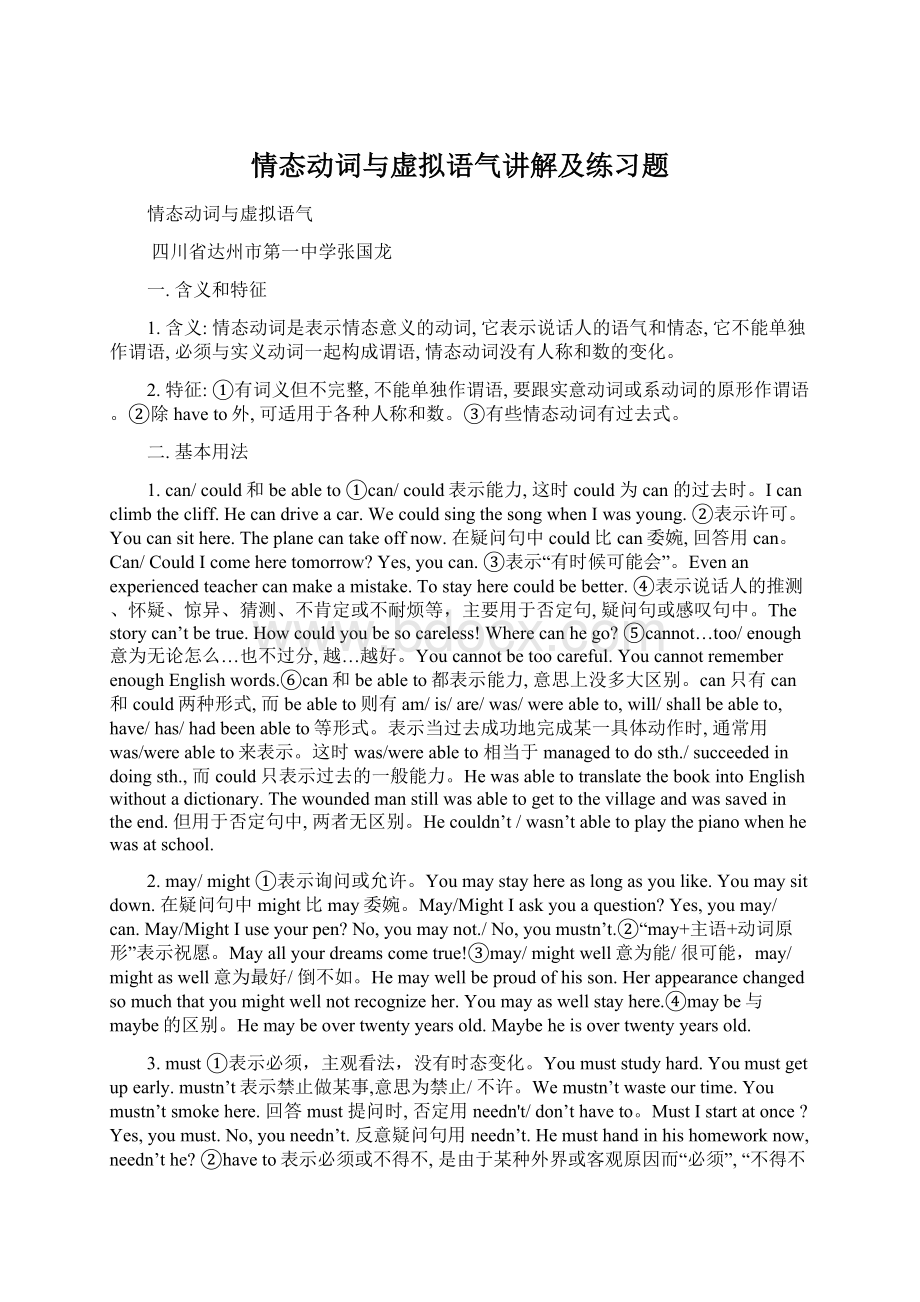情态动词与虚拟语气讲解及练习题.docx
《情态动词与虚拟语气讲解及练习题.docx》由会员分享,可在线阅读,更多相关《情态动词与虚拟语气讲解及练习题.docx(25页珍藏版)》请在冰豆网上搜索。

情态动词与虚拟语气讲解及练习题
情态动词与虚拟语气
四川省达州市第一中学张国龙
一.含义和特征
1.含义:
情态动词是表示情态意义的动词,它表示说话人的语气和情态,它不能单独作谓语,必须与实义动词一起构成谓语,情态动词没有人称和数的变化。
2.特征:
①有词义但不完整,不能单独作谓语,要跟实意动词或系动词的原形作谓语。
②除haveto外,可适用于各种人称和数。
③有些情态动词有过去式。
二.基本用法
1.can/could和beableto①can/could表示能力,这时could为can的过去时。
Icanclimbthecliff.Hecandriveacar.WecouldsingthesongwhenIwasyoung.②表示许可。
Youcansithere.Theplanecantakeoffnow.在疑问句中could比can委婉,回答用can。
Can/CouldIcomeheretomorrow?
Yes,youcan.③表示“有时候可能会”。
Evenanexperiencedteachercanmakeamistake.Tostayherecouldbebetter.④表示说话人的推测、怀疑、惊异、猜测、不肯定或不耐烦等,主要用于否定句,疑问句或感叹句中。
Thestorycan’tbetrue.Howcouldyoubesocareless!
Wherecanhego?
⑤cannot…too/enough意为无论怎么…也不过分,越…越好。
Youcannotbetoocareful.YoucannotrememberenoughEnglishwords.⑥can和beableto都表示能力,意思上没多大区别。
can只有can和could两种形式,而beableto则有am/is/are/was/wereableto,will/shallbeableto,have/has/hadbeenableto等形式。
表示当过去成功地完成某一具体动作时,通常用was/wereableto来表示。
这时was/wereableto相当于managedtodosth./succeededindoingsth.,而could只表示过去的一般能力。
HewasabletotranslatethebookintoEnglishwithoutadictionary.Thewoundedmanstillwasabletogettothevillageandwassavedintheend.但用于否定句中,两者无区别。
Hecouldn’t/wasn’tabletoplaythepianowhenhewasatschool.
2.may/might①表示询问或允许。
Youmaystayhereaslongasyoulike.Youmaysitdown.在疑问句中might比may委婉。
May/MightIaskyouaquestion?
Yes,youmay/can.May/MightIuseyourpen?
No,youmaynot./No,youmustn’t.②“may+主语+动词原形”表示祝愿。
Mayallyourdreamscometrue!
③may/mightwell意为能/很可能,may/mightaswell意为最好/倒不如。
Hemaywellbeproudofhisson.Herappearancechangedsomuchthatyoumightwellnotrecognizeher.Youmayaswellstayhere.④maybe与maybe的区别。
Hemaybeovertwentyyearsold.Maybeheisovertwentyyearsold.
3.must①表示必须,主观看法,没有时态变化。
Youmuststudyhard.Youmustgetupearly.mustn’t表示禁止做某事,意思为禁止/不许。
Wemustn’twasteourtime.Youmustn’tsmokehere.回答must提问时,否定用needn't/don’thaveto。
MustIstartatonce?
Yes,youmust.No,youneedn’t.反意疑问句用needn’t.Hemusthandinhishomeworknow,needn’the?
②haveto表示必须或不得不,是由于某种外界或客观原因而“必须”,“不得不”做某事。
haveto可用于多种时态,否定形式don’thaveto表示不必。
Youhavetowashyourownclotheswhenyouareatschool.Becauseofnomoney,hehastobehungry.Youdon’thavetostayathome.③表示“偏偏”之意,指令人不愉快的事情。
Whymustitrainonweekends?
Hemustplaythepianoatsuchalatehour.④表示必然的结果。
Ifyoudon’thurry,youmustmissthetrain.Allmenmustdie.
4.shall①shall用在第一、第三人称疑问句中,表示说话人征求对方的意见或向对方请求指示。
Shallwegooutforawalk?
ShallIbeginatonce?
Whereshallhewaitforus?
②用于第二、三人称陈述句中,表示说话人的意愿,有命令、警告、威胁、强制、允诺或决心等意思。
Theyshalldoastheirteachersays.Ifyoudon’tworkharder,youshallfail.Heshallbepunished.YoushallhavethebookassoonasIfinishit.Nothingshallstopusfromdoingso.③用于所有人称,表示规章、法令、预言等,意为“必须”。
ThelawshallcomeintoeffectonSeptember1st.Eachplayershallwearanumber.
5.should/oughtto①表示义务,责任,命令或劝告等,意为“应该”。
Youshouldbemorepatient.Youshoulddobetternexttime.Weoughttohelpeachother.在疑问句中表示建议。
Shouldwewait?
Shouldwestartatonce?
OughtItogo?
Yes,youought(to).②提出意见或请求,意为“想,倒想”。
Ishouldthinkso.Ishouldadviseyoutosaylessanddomore.③表示惊讶,难以相信或不应该的事。
Shouldshedosuchathing?
HowshouldIknow?
④oughtto表示表示义务,责任,命令或劝告等,语气比should强。
否定形式为oughtn’tto/oughtnotto,对一般疑问句的回答用ought(to).反意疑问句的附加部分用oughtn’t/shouldn’t。
Yououghtn’ttolieinbed.Ioughttohandinmyhomeworknow,oughtn’tI?
6.will①用于各种人称表示意志、意愿或决心等Dowhatyouwill.Ifyou’llhelpme,Iwillgowithyou.Iwillneverdosuchathingagain.②用于主语是第二人称you的疑问句中,表示邀请,请求或询问。
Willyougivemeapieceofpaper?
Willyoupleasetellherthenewswhenyouseeher?
③表示经常性、习惯性、倾向性等,意为“经常、总是”。
Marywillreadforhoursatatime.Fishwilldieoutofwater.Thedoorwon’topen.④表示命令(说话者确信命令一定会得到执行)或允诺。
YouwilldoasIsayatonce.Youwillreporttheaccidenttomeafterwards.Theywillgetenoughmoneyfromme.⑤表示能力或功能。
Thetreewillliveforthreemonthswithoutwater.Thebottlewillholdapintofmilk.⑥用于祈使句的附加疑问句中。
Haveacupoftea,won’tyou?
Givemeahand,willyou?
Bequiet,can’tyou?
Don’tforgetit,willyou?
Don’ttalkanymore,willyou?
7.would①用于各种人称表示意志、意愿或决心等,是will的过去式。
Shesaidshewouldtakecareofthebaby.可用于下列词组中,wouldrather,wouldlike/love,wouldprefer.②用于主语是第二人称you的疑问句中,表示邀请,请求或询问,语气比will委婉。
Wouldyoutellmethewaytotheairport?
③表示过去经常性、习惯性、倾向性等,意为“经常、总是”。
WhenIwasachild,Iwouldgoswimmingwithotherchildreninsummer.④用于祈使句的附加疑问句中,语气比will委婉。
Closethewindow,wouldyou?
8.need作“必须,需要”讲,既可作情态动词,也可作实义动词。
①作情态动词,通常用在否定句或疑问句中,没有人称、数、时态的变化。
Heneedn’tpaythemoney.Needwedoitagain?
Yes,youmust/haveto.No,youneedn’t/don’thaveto.②作实义动词时,有人称、数或时态的变化,其变化与一般动词相同,后面要跟带to的动词形式。
Heneedstothinkitover.Weneedtohavearest.Theydidn’tneedtoarriveearly.Thegardenneedswatering/tobewatered.
9.dare作“敢”讲,既可作情态动词,也可作实义动词。
①作情态动词,通常用于否定句,疑问句或条件状语从句中,没有人称、数的变化,但有过去式dared。
Shedarenotgooutalone.Dareshegooutalone?
Yes,shedare.No,shedaren’t.Hedarednottalkwithastranger.②作实义动词,有人称、数或时态的变化,其变化与一般动词相同,后面要跟带to的动词形式,但在否定句或疑问句中to可以省略。
Hedarestofacethedanger.Shedoesn’tdare(to)askaquestion.Hedidn’tdare(to)disobey.Doyoudare(to)enterthatcavealone?
Doesshedare(to)speakbeforeabigaudience?
10.usedto①意为过去常常,曾经,陈述的是事实,表示过去常常发生的动作,存在的(有规律的)习惯或过去某一时期的状况,但现在已经不再如此了,谓语动词为表动作的动词或be。
Heusedtosmokealot,butnowhenolongersmokes.Thereusedtobeanappletreeintheyard.Shedoesn’tgetupearlyassheusedto.②would陈述的是说话者的主观看法,强调反复多次的含义。
表示反复发生的动作或有可能再发生,谓语动词为表动作的动词。
WhenIpassedmyschool,Iwouldseemyteacherswhotaughtme5yearsago.Sheusedtomakemistakesinspellingwhenyoung.Shewouldmakemistakesinspellingwhenothershurriedher.
11.hadbetter意为“最好”,缩写为’dbetter,否定形式为hadbetternot,后跟动词原形。
Wehadbetterleavesoon.We’dbetterbuyanotherone.Wehadbetternottalk.Hadwebettergonow?
12.几个情态动词的否定形式的含义.can’t/couldn’t不可能,不能够,不许可.mightnot/maynot可能不,不可以,或许不.mustn’t禁止,千万别.needn’t不必shouldn’t/oughtn’tto不应该.benotableto不能够.won’t不愿意,不会.hadbetternot最好别.
三.表示推测的用法
1.表示推测的情态动词的可能性大小比较和句型差异。
词形
肯定句
否定句
疑问句
must
必定,必然,一定
/
/
will
很可能,大概
不会,不该
会吗
would
可能性比will小
不会,不该
会吗
should
确定或可能有的未来或期待
/
/
oughtto
总应该,理应(与should同义)
/
/
can
有时候可能会
不可能
有可能吗
could
可能
不可能
有可能吗
may
或许,也许,说不定
可能不
/
might
或许,也许,说不定
可能不
/
2.对不同时间发生的事情的推测。
①对现在或将来,用情态动词+动词原形.Hemaybeastudent.Hemuststayathometoday.Sheshouldarrivehereatnineo’clock.②对正在发生的事情,用情态动词+be+v-ing.Theymustbeplayingintheyard.Itmustberainingoutside.Thestudentcouldbestudyinginthelibrary.③对过去发生的事情,用情态动词+have+v-ed。
Theymighthavethoughtaboutthat.Hemusthavebeendisappointed.Theymusthaveseenthefilmlastweek.Hemusthavefinishedthetaskbytheendoflastmonth.④therebe句型也可用来表推测。
Theremightbeafarmhouse.Theremusthavebeensomemistakes.
3.含表推测的情态动词的反意疑问句。
其构成与情态动词无关,有以下几种情况:
①对现在或将来,谓语动词是实意动词要用do/does,是be直接用。
Hemightlikeplayingbasketball,doesn’the?
Hemustbeateacher,isn’the?
②对正在发生的事情,用be。
Theymustbereadingintheclassroom,aren’tthey?
③对过去发生的事情。
⑴没有时间状语,看成现在完成时,用have/has.Hemusthavevisitedtheplace,hasn’the?
⑵有过去的时间状语,看成一般过去时,用did。
Hemusthavevisitedtheplaceyesterday,didn’the?
⑶有过去的过去时间状语,看成过去完成时,用had.Hemusthavevisitedtheplacebytheendoflastweek,hadn’the?
⑷谓语动词是被动语态或be动词,一律用was/were.Thehousemusthavebeenbrokenintolastnight,wasn’tit?
4.情态动词+have+done的用法。
①musthavedone表示对过去已经发生的行为进行推测,意为“想必/准是/一定做了某事。
Itmusthaverainedlastnight,fortheroadwasquitemuddy.Thelightswereout,sotheymusthavebeenasleep.②cansb.havedone/can’thavedone表示对过去发生的行为的怀疑和不肯定。
Canhehavegonetohisaunt’s?
Hecan’thaveforgottenit.③couldhavedone可用于肯定句中,意为“可能已经…”,此外,还可以表示过去没有实现的可能性,意为“本来可以…”。
IsawMr.Wangjustnow.Hecouldn’thavegonetoBeijing.④may/mighthavedone表示对过去已发生行为的推测,意为“也许/或许已经(没有)…”。
一般用于肯定句或否定句中(在否定句中表示“可能不”),不用于疑问句。
用might则表示语气更加不肯定。
It’stoolate,soIthinkhemayhavegonetobed.Hemaynothavefinishedthework.Shemighthavecaughtacold.⑤mighthavedone表示“本来可能…”,但实际上没有发生的事。
另外,还可以表示“本来应该或可以做某事”之意,含有轻微的责备。
Hemighthavebeeneatenbysharkwhenhewasswimminginthesea.Youmighthavegivenhimmorehelp,thoughyouwerebusy.⑥should/oughttohavedone用于肯定句中,表示“本该做某事,而实际上未做”;用于否定句中,则表示“不该做某事而做了”。
Youshouldhavecometothemeetingearlier.Yououghttohavedonethisexercisemorecarefully.Youshouldn’thavetoldherthetruth.Heoughtnottohavetreatedhisparentslikethat.⑦needn’thavedone表示“做了本来不必去做的事”,而didn’tneedtodo表示“没必要做而实际上也没有做某事”。
Youneedn’thavetakenataxihere,foritwasveryneartomyhouse.Ididn’tneedtocleanthewindow.Mybrotherdidit.⑧hadbetterhavedone用于事后的建议,含轻微责备的口吻,意为“当时最好做了某事”,其否定式hadbetternothavedone意为“当时最好没有做某事”。
Youhadbetterhavestartedearlier.Youhadbetternothavescoldedher.⑨wouldratherhavedone表示“当时宁愿做某事”其否定式wouldrathernothavedone表达相反含义,两者都表示“后悔”之意。
Iwouldratherhavetakenhisadvice.Iraisedobjectionsatthemeeting,butnowIwouldrathernothavedonethat.⑩wouldlike/lovetohavedone表示过去愿意做某事,但未做成。
IwouldlovetohavegonetothepartylastnightbutIhadtoworkextrahourstofinishareport.
四.虚拟语气
1.含义:
表示说话人认为他所说的话是和事实相反的主观设想或主观愿望。
2.在非真实条件句中的使用。
条件状语从句
主句
与现在事实相反
一般过去时(be用were)
would/should/could/might+动词原形
与过去事实相反
had+过去分词
should/would/could/might+have+过去分词
与将来事实相反
一般过去时或should(wereto)+动词原形
would/should/could/might+动词原形
IfIwereaboy,Iwouldjointhearmy.Ifshehadtime,sheshouldgowithyou.Ifhehadtakenmyadvice,hewouldhavesucceededinthecompetition.Ifitweretoraintomorrow,thefootball